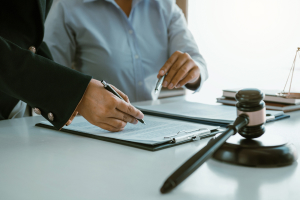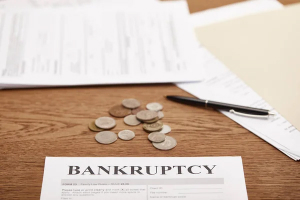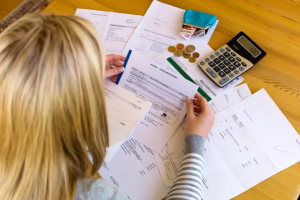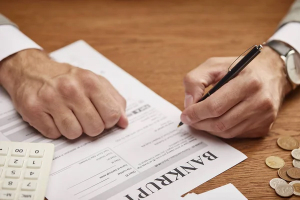This page was written, edited, reviewed & approved by Emil J. Fleysher following our comprehensive editorial guidelines. Emil J. Fleysher, the Founding Partner, has 15+ years of legal experience as a bankruptcy attorney. Our last modified date shows when this page was last reviewed.

Life can take unexpected turns, often leaving you in financial distress. We understand the pain, fear, and uncertainty that debt can bring into your life. Our compassionate team is here to guide you every step of the way. One potential solution to your financial struggles is filing for Chapter 7 bankruptcy. It may be a significant step, but it can also be a powerful tool to help you regain control of your life.
The decision to file bankruptcy is a major one, and while it can free you from the burden of overwhelming debt, it can also temporarily impact your credit score and ability to use credit to obtain loans or financing. Before filing for bankruptcy, you need to reach out to an attorney who can help you understand the benefits and risks. At Fleysher Law, we can help you decide if filing for bankruptcy is the right choice for you.
Learn more about how to get out of overwhelming debt below, and contact us to schedule a consultation.
Chapter 7 Bankruptcy is often referred to as a liquidation type of bankruptcy. It allows you to get rid of various debts you might owe, such as credit card debt, medical bills, and personal loans.You’ll be allowed to keep your exempt or fully liened assets, and potentially liquidate the rest.
When you file for Chapter 7, a bankruptcy trustee will be assigned to administer and oversee your case. The trustee will sell any non-exempt assets to repay your creditors. Then, the remaining eligible debts are discharged, erasing them and allowing you to start fresh.

To be eligible to file for Chapter 7 bankruptcy, you must meet certain criteria. These include passing the 'means test,' which assesses your income, expenses, and family size to determine whether you have sufficient disposable income to repay your debts.
If your income is below the median income in your state, you typically qualify to file Chapter 7 bankruptcy.
Chapter 7 and Chapter 13 are the two primary types of personal bankruptcy, but they function quite differently, with each offering different solutions based on your financial situation and objectives.
Chapter 7 bankruptcy, often known as 'liquidation bankruptcy,' is typically for individuals with little to no disposable income. If you file for Chapter 7, you sell your non-exempt property to pay off as much debt as possible. After the liquidation process, most of your unsecured debts will be discharged, meaning you're no longer legally required to pay them. The entire process can be completed relatively quickly, typically within three to six months, allowing you to start fresh in a relatively short amount of time.
On the other hand, Chapter 13 bankruptcy is often referred to as a "wage earner's plan." It's designed for individuals who have regular income and can afford to pay back at least a portion of their debts through a repayment plan. When you file for Chapter 13, instead of selling your assets, you'll propose a three-to-five-year repayment plan based on your income, living expenses, and unsecured debt amount. If you stick to the plan, any remaining unsecured debts will be discharged at the end of the repayment period. Chapter 13 also has benefits that Chapter 7 does not offer, like the ability to catch up on missed mortgage or car loan payments and keep your assets.
Choosing between Chapter 7 and Chapter 13 bankruptcy is a significant decision that should be made with a thorough understanding of your financial situation and future goals. It's critical to consult with a skilled bankruptcy attorney to help you make the best decision for your circumstances.

There are a lot of people who hesitate to file for Chapter 7 bankruptcy protection, but the reality is that there are a lot of benefits you will experience as well. Some of the top benefits of filing for bankruptcy protection include:
One of the most compelling benefits of Chapter 7 bankruptcy is the speed at which it can be completed. While some legal processes can stretch on for years, most Chapter 7 cases are completed within three to six months from the filing date.
This expedited process means you can quickly close the chapter on your financial distress and start working towards a more secure future. This fast resolution also relieves the stress and anxiety that accompanies severe debt.
Chapter 7 bankruptcy is often termed 'liquidation bankruptcy' because it involves liquidating your non-exempt assets to pay back as much debt as possible. However, one significant benefit is that it allows the discharge of most unsecured debt.
Once your bankruptcy process is completed, you are released from your legal obligation to pay any discharged debts. The relief that comes with knowing you're no longer responsible for unmanageable debts can be life-changing.
When you file for Chapter 7 bankruptcy, an "automatic stay" goes into effect. This immediate order halts most creditors from continuing collection actions against you. The ceaseless calls, letters, and even wage garnishment or repossession attempts from creditors stop. This pause gives you space to breathe and work through the bankruptcy process without the added stress of persistent collection efforts.
While Chapter 7 bankruptcy involves liquidating your non-exempt assets, it doesn't necessarily mean you'll lose everything. Bankruptcy law allows for certain property exemptions that protect specific assets from liquidation. These often include items necessary for day-to-day life, such as your house, car, and personal belongings, up to a certain value.
As a result, depending on the equity in your home or vehicle and the exemption laws in your state, you can keep these valuable assets.
Perhaps the most significant benefit of filing for Chapter 7 bankruptcy is the opportunity for a fresh financial start. After your bankruptcy discharge, you're no longer bound by the weight of your past debts. This clean slate can allow you to rebuild your financial life, free from the pressure and strain of insurmountable debt.
You can navigate toward a more secure financial future with careful planning and prudent financial decisions.
Filing for bankruptcy undeniably affects your credit score, and it will be lower immediately following the bankruptcy. However, it doesn't permanently bar you from obtaining credit. After your bankruptcy discharge, you can start taking steps to rebuild your credit.
Over time, as you consistently demonstrate responsible credit use, lenders may be more willing to extend credit to you, including home and auto loans. The journey to credit recovery takes time and patience, but a brighter financial future is certainly attainable. You can start with secured debt or a secured credit card.
Filing for bankruptcy is a serious decision and should be considered a last resort. Before filing, exploring alternatives that could help you regain control of your financial situation is essential.
Debt settlement means you will talk with your creditors to see if you can pay a reduced amount that will be considered as full payment of your debt. This approach can often be a viable option if you have a lump sum of money available, which can be used to settle the debt. However, debt settlement requires that your creditors agree to the arrangement, which is not always guaranteed.
Moreover, debt settlement can negatively impact your credit score, as it often involves stopping payments to your creditors to save up the needed lump sum, which leads to missed payments and delinquency.
A Debt Management Plan (DMP) is a strategy designed to help you manage your debt more effectively. You may partner with a financial credit or counseling company, which will combine your loans and debts into one more affordable monthly payment. The agency works with your creditors to lower your interest rates and waive certain fees, reducing your debt burden.
By using a DMP, you can have a structured payment plan that helps you pay off your debt in a set period, typically three to five years. However, it's crucial to understand that a DMP requires discipline and commitment to stick to the payment plan over several years.
Debt consolidation is another strategy that can help manage multiple debts. This approach combines several debts into a larger debt, usually with more favorable pay-off terms. This could mean lower interest rates, lower monthly payments, or both. Debt consolidation can simplify your debt management by replacing multiple monthly payments with a single payment.
You might use a debt consolidation loan, a zero-interest balance transfer credit card, or a home equity loan. However, while debt consolidation can lower your monthly payments, it might extend the repayment period, resulting in you paying more in total interest over time.

Filing for Chapter 7 bankruptcy is a serious decision that involves a multi-step legal process. It's important to understand these steps, as the success of your bankruptcy case largely depends on their careful execution. Below is an overview of the steps involved in filing for Chapter 7 bankruptcy:
It's crucial to consult with an experienced bankruptcy attorney to guide you through this process, ensure all necessary steps are taken correctly, and help you avoid potential pitfalls.

At Fleysher Law, we're here to help guide you through the difficult decision of filing for bankruptcy. Our skilled and compassionate bankruptcy attorney will assess your situation, explain the pros and cons of Chapter 7, and assist you in determining the best path forward. Contact us today for an initial consultation.
We understand the challenges and difficulties of financial distress. Our goal is to provide you with the guidance, support, and representation you need during this difficult time.
Contact us today to start your journey toward financial freedom.
We understand that you probably have a lot of questions about how the process will unfold, and examples include:
How long does Chapter 7 bankruptcy take?
Most Chapter 7 bankruptcy cases are completed within three to six months. The exact amount of time your case will take will depend on the schedule of the court system and the overall complexity of your situation.
How much does Chapter 7 bankruptcy cost?
While legal fees and other costs may vary depending on the complexity of your case, the bankruptcy court’s cost to file a Ch. 7 bankruptcy case (the Ch. 7 bankruptcy filing fee) in Florida has been $338 since 2021. There may also be attorney fees, which can differ depending on your location and the complexity of your case.
How long does Chapter 7 bankruptcy stay on your credit report?
A Chapter 7 bankruptcy can stay on your credit profile for up to 10 years from the date of filing as a public record. However, most clients’ credit scores are in the 700 range within one year from their date of filing. Once your credit score reaches the 700 range, you can qualify for most consumer loans (including auto loans).
In addition, under the current Fannie Mae underwriting guidelines, borrowers may be approved for a mortgage with approved credit 4 years after their bankruptcy filing.

Emil specializes in consumer bankruptcy, debt settlement, and mortgage modification, offering a holistic approach to solving mortgage and debt problems. Emil listens to clients, understands their circumstances and goals, and helps them make the right choices by presenting all options and contingencies.
He is dedicated to helping South Floridians regain their financial freedom from overwhelming debt caused by high interest credit cards, bad mortgage loans, and uninsured medical expenses.

"*" indicates required fields